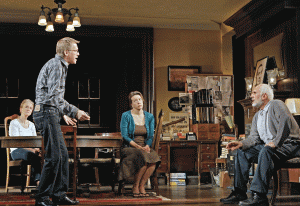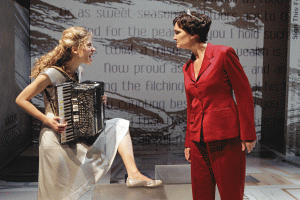The Marcantonios explain it all, and more
 The Intelligent Homosexual’s Guide exhibits playwright Tony Kushner’s wide-ranging interest in everything
By MORDECAI SPECKTOR
Some who have seen Tony Kushner’s much anticipated new play, The Intelligent Homosexual’s Guide to Capitalism and Socialism with a Key to the Scriptures — which had its world premiere on May 22 at the Guthrie Theater — complain that they can’t comprehend the densely layered dialogue; there are scenes in which three, four or five of the actors are all delivering lines simultaneously.
However, this should not pose a problem for any Jewish viewer who has attended a large family gathering where every other person at the table is trying to talk over everyone else.
The Intelligent Homosexual’s Guide is a cerebral, messy and fascinating family drama that runs about three-and-a-half hours over three acts; but it is well paced and does not feel overly long. Kushner has gathered a varied bushel basket of ingredients for this theatrical stew: gay, lesbian and straight romantic relationships; Catholic theology and Italian anarcho-communist ideology; the Epistles of Horace; a graphic description of do-it-yourself “self-deliverance” (suicide); the 1934 Teamsters rebellion in Minneapolis; and a reflection on strap-on sexual appliances (likely a first for a Guthrie stage), among other topics.
Director Michael Greif has done quite an amazing job of harmonizing a talented cast and bringing order to a script that fairly explodes with erudition and arguments. There is a heavily didactic aspect to the play; the historical tangents are mainly interesting, while some of the theological and literary allusions fly beyond the ken of your average Upper Midwest playgoer.
The protagonist of the play is Augusto Giuseppe Garibaldi “Gus” Marcantonio (Michael Cristofer), a 75-year-old retired longshoreman and Communist Party activist, who has lost the thread of his life. He has botched a bloody suicide attempt, and announced to his children and sister that he soon will be reprising his bid to end it all.
 Kathleen Chalfant (Benedicta Immacolata Marcantonio, “Bennie”), Stephen Spinella (Pier Luigi Marcantonio, “Pill”), Linda Emond (Maria Teresa Marcantonio, “Empty”) and Michael Cristofer (Augusto Giuseppe Garibaldi Marcantonio, “Gus”) are shown in a scene from Tony Kushner’s The Intelligent Homosexual’s Guide to Capitalism and Socialism with a Key to the Scriptures, in its world premiere at the Guthrie Theater. The play, directed by Michael Greif, runs through June 28. (Photo: Michal Daniel)
Kathleen Chalfant (Benedicta Immacolata Marcantonio, “Bennie”), Stephen Spinella (Pier Luigi Marcantonio, “Pill”), Linda Emond (Maria Teresa Marcantonio, “Empty”) and Michael Cristofer (Augusto Giuseppe Garibaldi Marcantonio, “Gus”) are shown in a scene from Tony Kushner’s The Intelligent Homosexual’s Guide to Capitalism and Socialism with a Key to the Scriptures, in its world premiere at the Guthrie Theater. The play, directed by Michael Greif, runs through June 28. (Photo: Michal Daniel)
Gus is bored — he asserts that he is losing his mind to Alzheimer’s disease — and translates Latin poetry to while away the days. “You’re only human if you have work to do… the work of your hands makes the world, your world,” Gus declares.
His children gainsay his plan to commit suicide as they gather around the dining room table.
His daughter, Maria Teresa (Linda Emond) — “MT,” or “Empty,” as she is called — is having a child with her lover, Maeve (Charity Jones). The sperm donor is the younger son, Vito (Ron Menzel) — so, the baby will actually be Empty’s nephew. The older son, Pier Luigi (Stephen Spinella), who is called “Pill,” has been married to Paul, a professor of theology, for more than two decades. (In one of many references to Minneapolis in the play, it’s mentioned that Paul had received an appointment in the GLBT Studies Program at the University of Minnesota.)
Another party to the proceedings is Gus’ sister, Benedicta Immacolata (Kathleen Chalfant), called “Bennie,” who is staying with Gus, after he was released from a locked psychiatric ward. Bennie has a curriculum vitae fully formed from the mind of the playwright: She journeys to a Carmelite convent in Peru, lives among the Andean poor and joins forces with the Sendero Luminoso (Shining Path) Maoist guerrillas. She later moves back to Paterson, New Jersey, and resides in a public housing project.
It is Bennie that Gus first confides in, regarding his plan to do himself in. Gus also plans to sell the family home for a good price, and divide the proceeds among his children, prior to his suicide.
A major subplot concerns Pill, who has been an inconstant lover to Paul. Over a year or so, Pill has become enamored of a young hustler, Eli (Michael Esper), and borrowed some $30,000 from Empty to pay for sex. In a tender scene during the third act, Pill confesses his transgressions to Gus, who seems to accept his son’s sexual orientation; but Pill reminds him, “You told me [homosexuality] was symptomatic of bourgeois corruption.” This was the fatherly advice imparted when Pill was 15.
Gus is superbly played by Michael Cristofer, an actor and playwright, whose voice and body evoke the elderly activist’s combative spirit and fatigue. Both Kathleen Chalfant and Linda Emond are veterans of other Kushner plays, and seem at home on the Guthrie stage. The local actors — Charity Jones, Ron Menzel, Michael Potts, et al. — also seem comfortable in their roles.
The rooms in the Marcantonio home glide fluidly on and off the stage, like moving parts in the proverbial fine Swiss watch. The clever set was designed by Mark Wendland; and subtle lighting by Kevin Adams, Clint Ramos’ costumes, and the sound by Ken Travis, keep the focus on the cascade of words on stage.
The Intelligent Homosexual’s Guide apparently will be tweaked and shaped in the months to come, when it is produced in other theaters. It is an intriguing play, but probably not a great one. The Marcantonios are a lively mishpacha, and they present a wealth of ideas — about politics, sexual relations, family and community — to ponder. This is a play that provokes thought and discussion; it’s a serious work of art that requires audiences to open their ears and minds.
***
The Intelligent Homosexual’s Guide to Capitalism and Socialism with a Key to the Scriptures will be presented on the McGuire Proscenium Stage at the Guthrie Theater, 818 S. 2nd St., Minneapolis, through June 28. For tickets, call the Guthrie Box Office at 612-377-2224, or go to: www.guthrietheater.org.
Â
Â
Kushner’s characters in the afterlife
By MORDECAI SPECKTOR
Three of the playlets comprising Tiny Kushner: An Evening of Five Short Plays, by Tony Kushner, directed by Tony Taccone, at the Guthrie Theater, are set in the afterlife. Two of them involve psychoanalysis. Angels appear in a couple of the plays. There is great humor and scathing political diatribes. All in all, a satisfying evening of theater.
A perky, smiling musician with curly tresses, “Miss Pamela,” played by Valeri Mudek, lights up the stage in the beginning of Flip Flop Fly! She is soon joined, on the moon in the world to come, by Geraldine, the dour, deposed queen of Albania (Kate Eifrig), who enters the scene in a Mercedes given to her family by Hitler.
The two women clash on a mostly bare stage, with words and graphics projected on three screens. The amusing opening piece features verbal sparring, as Geraldine exhibits contempt for the American; she has lived a difficult life, and has nothing in common with the “lunatic entertainer.”
Miss Pamela plumbs her philosophical depths with such pearls as: “Life is just a lot of made-up stuff, innit?”
The pair concludes with a rendition of the title song and a dance routine.
The first act ends with East Coast Ode to Howard Jarvis: A Little Teleplay in Tiny Monologues, which riffs on a real case of New York City public employees falling prey to a tax-evasion scheme. In a wondrous performance, Jim Lichtscheidl plays 23 characters — transit cop, housing detective and his teenage daughter, Sikh-American sanitation worker, Asian-American female city social worker, et al.).
The gist of the story is that some city workers latch on to a scheme propounded by Leonard “Hap” Dutchman, a far-right extremist in Indiana, whereby you can claim 98 exemptions on your IRS form and avoid all withholding taxes. A housing police detective says he “cannot understand a word” of the letter that his colleagues are using to evade taxes; but he has seen their pay stubs: “That is my kind of reading material. Three pay stubs like that and I’m gonna buy myself a motherflippin’ home entertainment center!”
Eventually, 500 or 1,000 city employees become enmeshed in the scam. At play’s end, a rumpled lawyer for the housing detectives, addressing a press conference, declares that his clients did not act out of ideological motives. “I wouldn’t call what clients did ideological, I… What’s that? Uh, well. I would call it more like… Uh, well, idiocy. Or lunacy. Take your pick.”
Humor and too much psychoanalytical jargon are featured in Dr. Arnold A. Hutschnecker in Paradise, which is also set in the afterlife. The titular doctor, played by local stage veteran J.C. Cutler, was Richard Nixon’s shrink. The doctor said that Nixon was an easy subject: “He wears his psyche on his sleeve.” Although, Dr. Hutschnecker admits that he couldn’t stand Nixon’s “anti-Semitic tirades.” It all boils down to the much-analyzed president’s fixation on his mother.
The evening of short plays concludes with Only We Who Guard the Mystery Shall Be Unhappy. Mudek and Eifrig, from the first play, reappear onstage as an angel and Laura Bush, respectively. The former First Lady has come to read a story for some children, who are represented by several tiny school chairs. The jolt for the audience is that these are dead Iraqi children — killed by American bombs in the run-up to the full-scale 2003 invasion of Iraq.
Bush allows that it’s sad that the children had to die; but the leader of their country, Saddam Hussein, was a very evil man. “It was necessary for you to die, sweetie,” she tells one of them, with her soft Texas twang.
The play, which begins as a political screed, as it implicates the audience in mass murder, changes tone, as Laura Bush discusses the story she will read: the passage about the Grand Inquisitor from The Brothers Karamazov. As she delves into the storyline, doubts begin to emerge and she asks aloud: “Isn’t this Grand Inquisitor starting to sound a lot like Dick Cheney?”
The spare setting of Tiny Kushner allows the audience to savor the playwright’s words without distractions. No band or chorus, just an amazing wordsmith at work.
***
Tiny Kushner: An Evening of Five Short Plays will be presented in the Dowling Studio at the Guthrie Theater through June 13. For tickets, call the Guthrie Box Office at 612-377-2224, or go to: www.guthrietheater.org.





















Comments 0